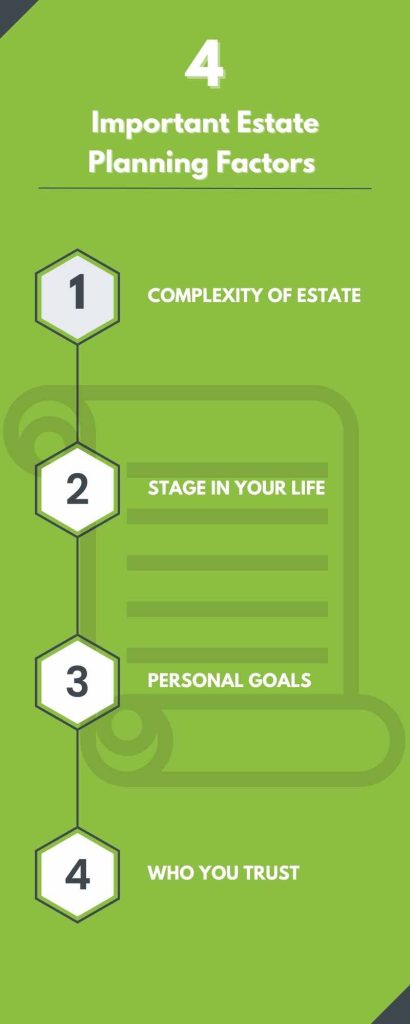
Estate planning is a road map for how your assets – both money and property – will be distributed after you die. It also defines how other important personal matters will be handled according to your instructions. This can include who will take care of any minor children or pets.
Because most people don’t like to contemplate their own mortality, estate planning is often a neglected aspect of financial planning. But as the population ages, it’s a topic that deserves more attention. Especially since nearly one in four Canadians will be a senior by 2030.

Table of contents
- What is estate planning?
- Estate planning checklist
- What are the four important estate planning factors?
- What is a will?
- Choosing the right resources
- What happens if you die without a will?
- Do I need an estate planning lawyer?
- Where does life insurance fit in estate planning?
- Keeping your estate plan updated
- Pre-planning for end of life
What is estate planning?
Estate planning encompasses a wide variety of elements, including legal documents and preparations for your family. An estate plan can include everything from a ‘living will’ for your health care if incapacitated to a will after your passing. It spans the naming of an executor to carry out your wishes, appointing a guardian for minor children, and more.
Experts are also starting to notice the inclusion of digital assets (eg. bitcoin, social media accounts) and beloved pets in estate planning.

Match to your perfect advisor now.
Getting started is easy, fast and free.
Estate planning documents
The main legal documents are:
- Power of Attorney (also known as a ‘living will’)
- A will, outlining provisions for the management of your finances and medical care if you become incapacitated through injury or illness. It also protects your assets while you are still alive.
A will comes into effect when you pass away. It provides instructions on how your assets will be managed after you’re gone, such as payments to named beneficiaries.
Creating an estate plan provides peace of mind. You can simplify settling your estate, and minimize taxation and administration costs. Proper estate planning can greatly reduce the burden on those left behind. Most importantly, it can avoid uncertainty about how to settle your estate.
Estate planning checklist
Creating an estate plan may seem daunting. First, it’s important to think through your goals and wishes. Making these basic decisions before starting the process can save you time and money. Some questions to ask:
- Who do you want to provide for after your death?
- What assets do you have and how would you want those divided or allocated?
- Do you have a primary beneficiary? Who would be the next choice if something were also to happen to that beneficiary?
- Who would you want to become a guardian for your children if they are minors? And has that person consented to be the guardian?
- Who would make decisions on your behalf if you were still alive, but unable to speak for yourself due to illness or injury?
Many people think writing your will is a daunting, overwhelming process. In reality, it’s a simple legal document that outlines a few key roles. While you don’t need to list your net worth or include detailed inventories, the more information you compile for your executor, the easier their job.
Online estate planning platform Willful has compiled a helpful checklist to help you prepare to write your will and Power of Attorney documents. (Download it here.) And we have compiled the following steps you can take to provide as much information as possible for your executor and create your estate planning checklist:
The important paperwork:
- Make a list of your key assets: (eg. your house and investments) Note that your will covers your umbrella estate (everything you own). So it’s not necessary to list everything in detail. Rather this list of assets will help inform whether you want to leave certain items or accounts to specific people.
- Make a list of your liabilities: (eg. a mortgage or loans) This ensures your executor will know what debts need to be paid from your estate.
- Ensure that you have named beneficiaries for investments such as RRSPs and LIFs: You can work directly with your financial institution or insurance company to add/update any named beneficiaries. If there is a named beneficiary on a policy/account, it will go directly to that person rather than being covered by your will. This reduces taxes, and it means payments are made to beneficiaries much faster.
- Record life insurance policy information: Include policy numbers, the company issuing the policy amounts payable, and named beneficiaries on the policies — both personal and employer group policies.
- Make note of any disability income insurance available for your care if needed.
The key people:
- Choose the person or persons you want as your Power of Attorney for health care. They will act on your behalf if you are incapacitated. Make sure you speak with them so they’re aware of the appointment. And consider who you would add as a backup in case they’re unable to perform in the role.
- Select the executor for your will: Just like your Power of Attorney, ensure you speak with them first and choose backups. Being an executor is a big job and it’s important to ensure the person you choose is up for the task.
- Decide your beneficiaries: They’ll receive a percentage of your residual estate (everything that’s left after debts/taxes are paid and any specific gifts are distributed).
- If you have dependent children, choose a guardian for their care and management of their inheritance.
- Provide for family members with special needs to ensure government benefits will continue

Special considerations:
- If you have pets: Decide on care for them after your passing. Be sure to leave a lump sum to your chosen pet guardians for their care if you choose.
- Create a list of any important items you want to give to specific recipients. For example, you can leave a lump sum to charity, give a piece of jewelry to a family member, or gift a car or property.
- Consider any particular issues that might pertain to your estate like trust funds, separation agreements, etc.
- Review whether any assets are jointly owned: Review the ownership structure to understand how those assets will or will not pass through your estate.
- If you are a business owner, provide for the transfer of the business in case of disability or death.
What are the four important estate planning factors?
#1 – The complexity of your estate
The scope of the estate will often determine how simple or complicated the estate plan will be. Are you a multi-millionaire or have you had multiple marriages and children with more than one partner? If so, your estate planning will likely be complex. Other elements that can add complexity are foreign assets, businesses, and setting up complex trusts.
#2 – Your stage in life
Do you have young children who are dependent on you? Do you have elderly parents relying on your support? In those instances, your dependents will be a primary consideration in your planning. If you are a senior with no children, you may want to consider leaving a charitable legacy rather than naming beneficiaries.
#3 – Personal Goals
Are you creating an estate plan to provide for surviving children or other relatives? Do you want to ensure a partner’s standard of living is sustainable after your passing? It’s important to consider what is important to you as you create your estate plan.
#4 – Who you trust.
This includes choosing a trusted person or persons to act on your behalf should you become incapacitated while still alive. And it includes having a reliable executor to carry out your instructions after death.
What is a will?
The main pillar of your estate plan is your will. A will is a legal document that defines how you want your property distributed and defines care for dependents. That includes your choice of executor, your beneficiaries, what each receives, any special allocations of personal items to specific recipients, and more.
A will is particularly important when there are multiple beneficiaries. Beneficiaries can be defined as primary or secondary. For example, you might name your spouse and children as primary beneficiaries. If they also pass away before the will is executed, secondary beneficiaries would be the recipients.
A will can also include funeral and burial wishes. While they’re not legally binding aspects of the will, they are a blueprint your family can follow.
Willful reported a 500% increase in website traffic and a 450% increase in the volume of wills sold at the start of the COVID-19 pandemic in Canada. It’s human nature not to act with urgency unless there is a compelling reason. But with so many negatives associated with not having a will, it’s clear why a will is considered the key building block of estate planning.
Choosing the right resources
A key part of creating your will is selecting your executor. Executors often have to deal with selling real estate, filing court and tax documents, paying outstanding taxes, and distributing assets. As a result, make sure you get someone who is a reliable resource.
Don’t have a suitable friend or family member? A professional such as an accountant or lawyer can be named as your executor. This is typically a role that requires hundreds of hours of work. Even the simplest of estates can take 12-18 months to wrap up. So ensure you choose someone who has the capacity to take this on. Willful has more about choosing an executor.
For parents with dependent children, choosing the right guardians is critical. It can be a lengthy commitment for guardians and trustees depending on the children’s ages and the timespan of the trust created.
Ideally, people appointed should be younger than you are and live in the same province, given that laws vary provincially. Above all, make sure that people are aware you have selected them for these roles since there are responsibilities that go along with each of being a trustee, guardian, power of attorney, or executor.
What happens if you die without a will?
In a 2020 survey commissioned with Angus Reid, Willful found that 57% of Canadian adults did not have a will. And a whopping 89% of Canadian adults under 34 don’t have wills.
A person who dies without a will is called an intestate, and your assets are distributed according to provincial legislation. Without a will, what you might have envisioned happening to your assets and what actually happens when you die may be completely different.
Even if you have shared your intentions with family members, without a will your wishes may not be carried out. There is much more room for family drama in situations where there is no will.
Without a will, you cannot choose your beneficiaries or who will administer your estate.
Failing to have a will in place can also mean delays in resolving an estate, with higher administration costs and higher taxes. That leaves less for your beneficiaries and more in the pockets of the government and lawyers. Without a will, the courts will appoint an administrator to wrap up your estate, and it may not be the person you would have chosen. Finally, it takes longer, which delays any payments to beneficiaries.
Is it better to have a will or a trust?
Wills and trusts are not mutually exclusive. Often trusts are created within a will as a ‘testamentary trust.’ This trust appoints a trustee to manage assets on behalf of a beneficiary. Trusts are commonly used when the beneficiary or beneficiaries are minor children or disabled individuals.
The trust can stipulate that funds can be accessed by a child only for educational purposes until a defined age. At that time, for example, 21 or 25 years of age, the child would receive the balance of the trust.
A trust can also be used to reduce tax implications. Finally, it can ensure proper professional management of assets after a person’s death. For example, a testamentary trust could be useful in managing a legacy gift from a deceased person to a charity.
Along with testamentary trusts, another common trust in Canada is inter vivos (living) trusts that come into effect during a person’s lifetime. It could be valuable to think about whether a portion of your wealth should be dealt with while you are living. For example, a family business succession plan could tie into your estate plan. Many older people are even re-evaluating their planned inheritance, thinking they’d like to experience the joy of seeing their children, grandchildren, or younger family members put this money to use.
Do I need an estate planning lawyer?
A lawyer does not have to create your will. It’s simply a document that outlines your end-of-life wishes and distribution of assets. However, there are important elements that should be included in your will. So to ensure that you cover all the bases, it’s best to either use an online will service or consult a lawyer to prepare your will.
Regardless of how you create your will, it must be signed and dated by you and two competent adult witnesses who are both present at the same time. The original hard copy of that signed document needs to be stored in a safe place where your executor or a family member can access it.
Online will or lawyer?
For those with straight-forward circumstances, creating a will online is a viable option. Willful has a simple process that walks you through will creation in less than 20 minutes. (Read their guide to online wills to find out more about this cost-effective, accessible option.) The wills produced on Willful are legally-binding when signed and witnessed properly. The cost of an online will is a fraction of traditional wills and incredibly convenient.
In the case of more complex scenarios, or if you want personalized legal advice, it may still be wise to consult a lawyer to create your estate plan. Along with the creation of a will and naming of health care power of attorney, property power of attorney, and executor, a lawyer can help with complex family business implications or challenging tax scenarios.
“There are circumstances where legal advice on will creation is critical to ensure that the goals of your estate plan are achieved. Those situations include instructions for liquidation of assets such as family cottages which may involve multiple stakeholders or beneficiaries in a family,” said Marlenne Doss, LL.B. of Doss Law Professional Corporation.
“It can also be vital for establishing an estate plan for blended families and for the allocation of assets located outside Canada, such as properties in the U.S. Family-owned businesses are another contentious holding For large or complex estates, we do recommend creating your will in consultation with a lawyer.”
Where does life insurance fit in estate planning?
One key use of life insurance in estate planning is to equalize payouts to beneficiaries. For example, you may choose to leave your investments to your partner but want to ensure your children also receive a legacy payment. Or one child may be taking over the family business while the other is not. Life insurance can provide additional funds to ensure fair distribution of assets, equalizing the estate and helping you to meet your estate planning goals.
Keeping your estate plan updated
Regardless of how an estate plan is created, it’s important to revisit the plan every few years or at major milestones like a marriage, divorce, buying a home, or birth of a child. That will ensure your estate plan keeps pace with changing circumstances at each stage in life.
Pre-planning for end of life
Some people may find that prearranging burial plots or cremation, or planning celebration of life services in advance is one step too far. For others, there is reassurance in knowing what will happen when they pass. These pre-planned steps can reduce stress on the family when the time comes.
Another advantage of pre-planning is paying less for such items as funerals, cemetery plots, and more. The cost of these services is continuing to rise so there are financial advantages to being prepared.
Again, whatever provisions are put in place, all relevant documents should be stored in a safe place. Share the location of documents with family and your executor/power of attorney/trustee. You can also register your will on the Canada Will Registry, which will help your family locate it in the event they can’t find it.
Your financial situation is unique, and we can help you find the best advisor for your needs. Just fill out our short questionnaire.
*Advisorsavvy blogger Shelley Grandy is an investor in Willful.

